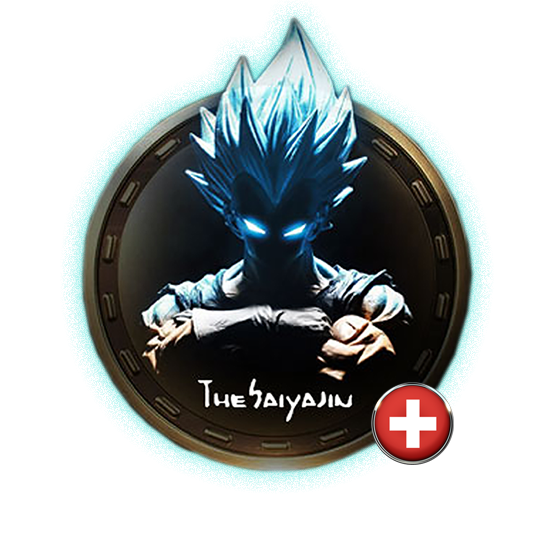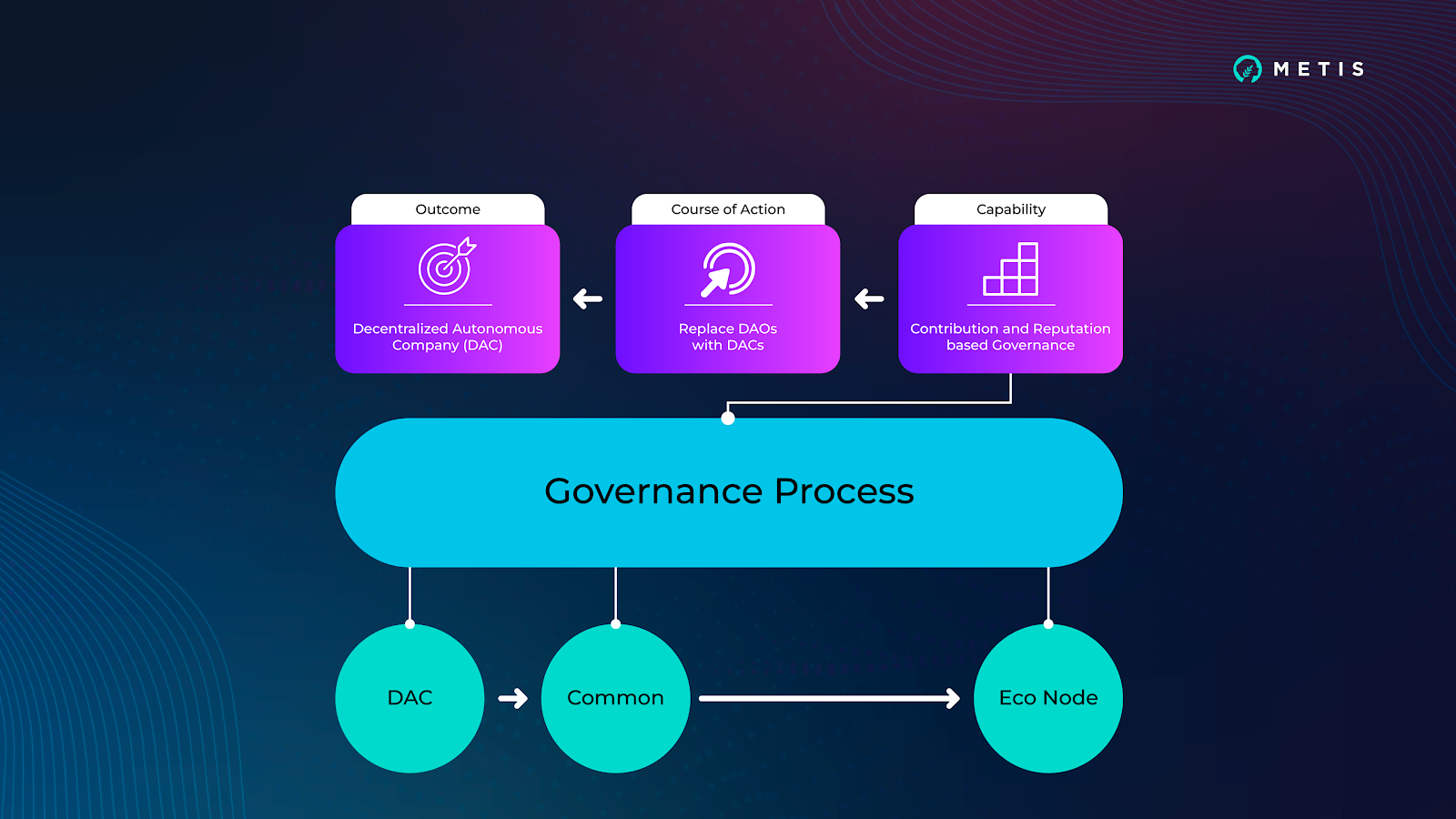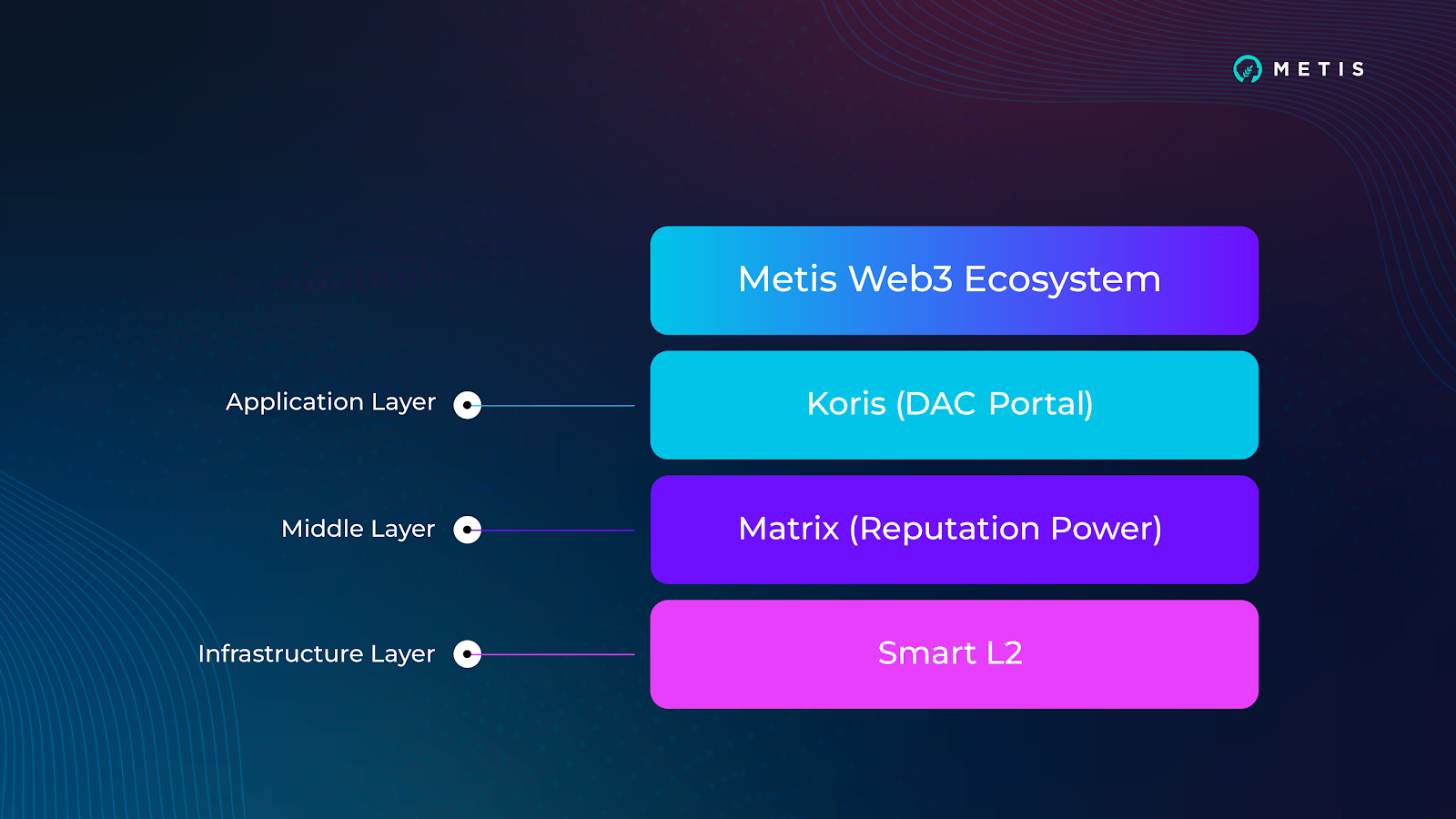
DAC - long explanation...


Metis is a Decentralized Autonomous Company (DAC)-centric platform to power the web3 economy. The Metis Stack is reputation based, highly customizable, and dynamic.
Governance is a critical component for collaboration and decision-making in a decentralized environment. We believe that contributors should govern the ecosystem based on the level of their contributions following the principle of responsibility for their decisions and accountability for the outcomes of such decisions.
The issues of current token-based governance
DAOs, decentralized autonomous organizations, have held a significant, grounded position in the web3 space for years. They are specifically characterized as autonomous and transparent entities governed entirely by the community. In this type of organizational structure, all functions present in the entity can be employed without the use of intermediaries or centralized authority.
However, there are some governance-related challenges that we recognize and plan to address:
One person — one vote
- whale voting — one person has a disproportionate influence on the vote based on the number of tokens in possession
- early adopters influence — due to lack of funding during the establishment of the organization, early adopters can be given substantial stakes through tokens, which gives them the same voting power advantage that whales have
- vote sales — the ability to buy votes gives an advantage to people with funds
- abuse of power by the voting delegates — voting delegates may have an opinion on the voting matter which is different from the person who delegated the vote
- time to pass the initiative (proposals, voting, etc.)
- low voting activity
- inexperience or lack of knowledge in the area related to a specific vote
- lack of responsibility/accountability for voting decisions — no reward/punishment mechanism based on the consequences of the voting
DACs, or decentralized autonomous companies, use a different system of governance.
DACs can handle business functions especially well with autonomous functions such as administrative tasks, payroll, communication, etc. Companies are therefore able to launch their decentralized businesses easily. In this system, unlike DAOs, governance is chosen by people who have a reputation for contributing and adding value to the organization instead of those who have the most governance tokens. Reputation is demonstrated in the form of badges or NFTs. In this case, the value of DACs comes from the contributions of members, not the value of the governance token or organization as a whole as seen with DAOs. Here, we can replace inefficient token-based governance mechanisms present in current DAOs with ones based on users’ actual contributions and local reputations. Contributors as a whole can govern, not just a selected group with voting power.
With DACs, we have two main goals:
- Prioritize the needs of real businesses by representing community members with web3’s shared values: accessibility, democracy, decentralization
- Provide the ability for anyone to create a web3 company, have full ownership over data/reputation, and utilize tools to collaborate with community members without third-party approval
Competition is the law of the jungle, but cooperation is the law of civilization ~Peter Kropotkin
MetisDAO Foundation proposed a Reputation Power-based structure depicted above.
Everybody who wishes to utilize the Metis ecosystem can do so without any limitations. DAC is the «heart» of the ecosystem — it is a «business entity», which can be represented by a person or a group of people.
A person may choose to organize or join existing DAC(s). If a person would like to become a «citizen» of the platform (have voting rights and propose any changes to the platform), they need to become a Common by staking Metis tokens and accumulating veMetis.
Commons then can fill a gap in the Metis ecosystem by identifying an area of need and coming forward with the proposal.
Upon approval of the proposal by the MetisDAO Foundation and existing EcoNodes, that Common will become an EcoNode providing services to the ecosystem by filling the identified gap. EcoNodes are expected to have a business model, and be self-funded «atomic» entities in the Metis ecosystem. MetisDAO Foundation is expected to provide shared services to EcoNodes.
By staking veMetis Commons and EcoNodes will have governance power using the Upper and Lower Houses governance analogy.
Governance rules for becoming a Common/EcoNode and maintaining the status will be presented in the upcoming .
The ultimate goal is to empower cooperation and grow the Metis ecosystem to the benefit of every community member.
DACs as a Governance Solution:
Similar to a DAO, the DAC is non-exclusive to create.
veMetis
veMetis is the governance token used in Metis ecological governance voting. It will not be available for purchase or trading.
- veMetis can only be obtained by staking Metis in DACs at the Commons and EcoNodes level.
- veMetis cannot be traded or manually destroyed (only the node contract can destroy veMetis).
- The corresponding proportion of veMetis will be destroyed when the staked Metis is withdrawn.
- During ecological voting, veMetis will be scanned and calculated at the DAC level to be counted as voting power.
DACs
As mentioned earlier, DAC is an individual-centric, decentralized framework to support and facilitate every person’s collaboration in the web3 world, which will be on-chain, Reputation Power based, and open for community members to co-build and co-govern.
Commons
Anyone in the community can create a DAC and become a Common by staking Metis tokens and accumulating veMetis for future decision-making power.
Why become a Common? Common members can make proposals and by doing so participate in the governance process.
You can invite other people to join your Common which increases voting power. You also have the freedom to choose which Common to join depending on your contribution interests, and you can quit if you are not satisfied with a Common’s decision. Common members who choose to quit lose their associated veMetis.
With this approach, every single person can exert their influence or have the freedom to choose which Common to support, which also provides a way for small token holders to gain leverage against whales.
EcoNodes
Commons can grow into EcoNodes if they contribute to the growth of the Metis ecosystem and will fund themselves through a robust revenue model and outside investments.
Similar to a DAO, the DAC is non-exclusive to create.
Existing EcoNodes
Existing needs and challenges natively led Metis into the creation of the first EcoNodes:
- DAC Portal is required to organize a DAC — a core entity in the Metis ecosystem.
- Matrix (Reputation Power) is required to establish reputation-based governance.
- Smart L2 is the core infrastructure layer the Metis ecosystem is built upon.
NUVO
NUVO guarantees that businesses receive access to valuable, verifiable data, free of costly infrastructure, and users receive financial benefits and privacy peace of mind. We provide all-in-one privacy-driven IDaaS developer solutions that allow developers to focus on what matters most to their clients at a fraction of the cost. Users get incentivized by sharing data, and with the unique Matrix Reputation Power system, which allows gamification, developers can easily attract new and retain existing users. Welcome to the age of Democratic DataFi & IdentiFi.
Smart L2
Smart L2 is an Ethereum scaling tech infrastructure designed for the growing web3 economy. An EVM equivalence network that is fast, low cost and highly secure with the inherence of Ethereum decentralized security. Deploy, create and expand faster than before in a builders friendly environment.
Koris (DAC Portal)
DAC Portal is a solution for DAOs, web3 businesses, and internet native companies (web2 alike) to optimize the benefits of decentralized growth and on-chain operations.
P1X
P1X is founded by the early investors of Metis, which will be in charge of the Metis Asian community, marketing, incubation, and investment.
etis DAC (MetisDAO Foundation)
MetisDAO Foundation is currently coordinating the resource allocation, marketing, events, and community among all the EcoNodes. Its responsibility is to make sure that the overall health of the ecosystem is intact and as such, for the time being, MetisDAO Foundation will have a veto right to any decisions affecting the Metis ecosystem.
During the implementation, MetisDAO Foundation will lead efforts to define and establish a governance process, and ultimately in the future, MetisDAO Foundation is planning to cede decision-making power to the community of the EcoNodes.
As the general public’s interest in remote work and autonomy in the workplace
continues to grow, decentralized workplace structures will continue to move into the spotlight as practical solutions come to the fore to meet this growing demand. Let’s see
where the common path takes us....
We start in Switzerland, not only because this is the home of the initiators of TheSaiyajin,
no! Switzerland, known worldwide for its high level of trusts and neutrality, already has
the principles of decentralization and direct democracy deeply embedded in its culture.
Public interest in remote work and workplace autonomy continues to grow, that’s why we’re joining in DAOtribution Grants by koris.io
 Confoederatio Helvetica
Confoederatio Helvetica




